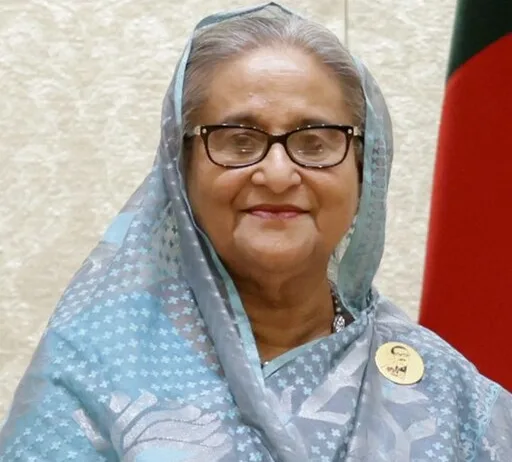Former Bangladeshi Prime Minister Sheikh Hasina, who sought refuge in India amid violent protests, is ready to face trial in her home country
Sheikh Hasina, the former Prime Minister of Bangladesh, is preparing to return to her home country to face trial, her son Sajeeb Wazed has confirmed. Hasina, who led Bangladesh for 15 years, fled to New Delhi on Monday after violent protests targeted her official residence. The protests, which have resulted in significant casualties and widespread unrest, were sparked by discontent with a job quota system favouring veterans from the 1971 independence war.
The violence, which claimed at least 455 lives and injured thousands, intensified over five weeks. Protesters, predominantly students, demanded accountability from Hasina and her government for alleged corruption and misuse of the job quota system. The unrest quickly evolved into a broader protest against economic mismanagement, corruption, and perceived authoritarianism under Hasina’s regime.
Embed from Getty ImagesIn response to the escalating situation, Hasina sought refuge in India via a military helicopter, accompanied by her sister. Following her departure, the Bangladeshi military announced the formation of an interim government. Bangladesh’s President Mohammed Shahabuddin dissolved parliament and appointed a temporary administration, led by Nobel laureate Muhammad Yunus, to restore stability.
Sajeeb Wazed, speaking from Washington, emphasized that his mother was prepared to confront the charges against her. He defended Hasina, arguing that while there were issues within her government, she personally did not authorize any violence against protesters. Wazed criticized the media and political opponents for misrepresenting his mother’s actions and insisted that the violence was not a result of her direct orders.
The protests, which saw police using tear gas, stun grenades, and live ammunition against demonstrators, were partly fueled by allegations that Hasina’s party, the Awami League, manipulated the job quota system to benefit its supporters. The government’s heavy-handed response, including internet and communication blackouts, further inflamed public anger and led to calls for Hasina’s resignation.
Wazed stated that Hasina did not officially resign before fleeing, arguing that the interim government’s legitimacy could be challenged in court. He also expressed his belief that the Awami League would contest the upcoming election, expected within the next three months, and potentially regain power. Wazed indicated that he might consider running for prime minister if the party desires.
Despite the turmoil, Wazed welcomed statements from Khaleda Zia, the leader of the main opposition Bangladesh Nationalist Party (BNP). Zia, who was recently released from house arrest, urged for a focus on democracy rather than revenge. Wazed expressed willingness to collaborate with the BNP to ensure a democratic and peaceful election process.
Analysis:
Political:
The dramatic events in Bangladesh have significant political implications. Sheikh Hasina’s flight and the formation of an interim government reflect a major shift in the political landscape. The interim government, led by Muhammad Yunus, symbolizes a temporary resolution to the crisis but also raises questions about the future political stability of Bangladesh. The Awami League’s decision to contest the next election, despite the upheaval, indicates ongoing political competition and a desire to reclaim power. The legitimacy of the interim government and the potential legal challenges posed by Hasina’s supporters highlight the complexities of Bangladesh’s political environment.
Social:
The riots underscore deep-seated social issues in Bangladesh, including economic disparities, corruption, and frustration with the political elite. The student-led protests that ignited the unrest reveal a generational divide and a growing demand for accountability and reform. The heavy-handed response from the government, including violent crackdowns and communication blackouts, has exacerbated social tensions and highlighted the broader dissatisfaction with the ruling authorities. The ability of the protests to mobilize widespread support illustrates a significant shift in public sentiment and the desire for change.
Racial:
While the immediate context of the protests does not center on racial issues, the broader social unrest reflects underlying ethnic and class tensions. The job quota system, which was a catalyst for the protests, touches upon issues of meritocracy and perceived favoritism. The unrest and its aftermath may indirectly impact ethnic and social cohesion, as different groups navigate the political and economic fallout from the violence. Understanding these dynamics is crucial for addressing long-term societal divisions.
Gender:
Gender dynamics play a subtle but notable role in the unfolding crisis. Sheikh Hasina’s leadership and subsequent flight underscore the challenges faced by women in high-profile political positions. The protests and subsequent actions of her government, including violent responses, affect both men and women, but the narrative around Hasina’s role and her son’s defense highlights the gendered aspects of political leadership. The involvement of women in the protests and their experiences during the unrest also reflect broader issues of gender equality and representation in political movements.
Economic:
The economic implications of the crisis are significant. The violence and instability have disrupted economic activities, damaged property, and strained resources. The government’s response, including the deployment of military forces and the imposition of communication blackouts, has further impacted economic operations and investor confidence. The uncertainty surrounding the political transition and the potential for further unrest could have lasting effects on Bangladesh’s economic stability and growth prospects. The interim government’s handling of the situation will be crucial in restoring economic stability and investor confidence.
